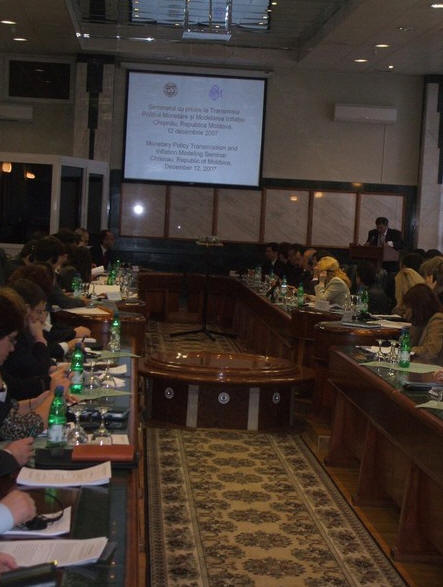"Monetary transmission and inflation modeling"
On December 12, 2007, the National Bank of Moldova hosted a seminar on the topic: "Monetary transmission and inflation modeling", organized jointly with the IMF. Seminar was attended by experts from IMF, European central banks, European Commission, representatives of state authorities of Moldova, banking sector, civil society.

Seminar papers:
Inflation modeling – one of the
required conditions for ensuring
and maintaining the price
stability in Moldova -
Mr Victor Cibotaru, NBM's First
Vivegovernor
(în Romanian language)
Cross-country differences in monetary policy transmission in central banks models
Mr Julian Morgan, Central European Bank
In search of monetary transmission in Moldova
Mr Nick Gigineishvili, IMF
Further estimations of the bank lending channel in the Russian Federation
Mr Lucio Vinhas de Souza, Comisia Europeana
Financial integration among new EU member states and the Euro Area
Mr Lubos Komarek, Banca Nationala a Cehiei
Monetary transmission mechanism and inflation modeling in Poland
Mr Ryszard Kokoszczynski, Banca Naţională a Poloniei
Effects of convergence on exchange rate and inflation
Mr John Lewis, Banca Olandei
Issues in adopting inflation targeting in Albania
Mr Erjon Luci, Banca Mondiala, Albania
Interest rate pass-through in Central and Eastern Europe
Mr Balazs Egert
Info: NBM, photo: FMI
Photo gallery
More information can be found in the
newsclip below from Basa-Press News
Agency...
National Bank to make a transition to
direct inflation targeting regime in
three years
Chisinau-12.12.2007/15:10:14/(BASA-economic)
The National Bank of Moldova (BNM) will
make a transition to a
direct inflation targeting regime in
two-three years, stated BNM Deputy
Governor Victor Cibotaru at the seminar
on "Transmission of monetary policy and
modelling inflation" held on Wednesday.
The final objective of direct inflation
targeting is to reduce considerably the
inflation level in Moldova. It implies
that the central bank will make a public
declaration about a quantitative
inflation target for a certain period of
time coupled with the objectives of the
central bank to follow and reach this
figure. Inflation targeting represents a
direct tackling of the inflation issue
rather than a set of specific
instruments of the monetary policy,
stated the BNM official.
According to Cibotaru, a big part of the
countries in Central and East Europe
that faced and continue to face similar
inflation problems moved to the
objective of direct inflation targeting.
BNM has already made the first step in
the transition to inflation targeting by
its recent development and approval of
the action plan on the implementation of
the inflation targeting strategy,
Cibotaru says. It provides for the
optimization of the BNM's monetary
policy operations, establishment of an
appropriate database and of the
analysis, modelling and forecast
framework, development of the public
information policy and of the actions to
improve the degree of civil society's
confidence in the monetary policy. The
action plan is planned to be carried out
in 2-3 years, constituting a period of
transition to the direct inflation
targeting regime, the BNM first deputy
governor stressed.
The inflation target will be set based
on some analyses and modelling of an
eventual evolution of the macroeconomic
indicators. And based on the obtained
forecast, the central bank will promote
a monetary policy that will be aimed at
levelling the effects that may lead to
an inflation targeting failure. Once the
inflation figure is announced, the BNM
will make it available for the public
and explain to the general public both
the inflation level forecast, and the
instruments applied with a view to
temper the inflation expectations.
The following conditions should be in
place for direct inflation targeting:
bank's independence, a stable and well
developed financial market, availability
of effective monetary instruments, an
analysis and forecast unit within the
bank.
The National Bank Law 2006 created the
necessary, but insufficient requisites
for inflation targeting, therefore we
are aware of the fact that we will be
able to talk about a success in the
inflation issue only when its level will
get closer to the one in the developed
countries, said First Deputy Prime
Minister Zinaida Grecianii.
According to Grecianii, the efforts to
bring inflation at a level by one figure
will imply certain costs, however, from
the economic growth perspective they are
completely justified. To this end, the
Government will support BNM's efforts to
preserve inflation by a severe budget
policy.
The seminar was organized by the
National Bank of Moldova and the
International Monetary Fund and is aimed
at informing civil society and business
community about the BNM's plans to make
a smooth transition to inflation
targeting policy. The event was attended
by decision-makers, representatives of
the banking sector and IMF, Central
European Bank officials as well as
officials of the central banks from
Albania, Czech Republic, the
Netherlands, Poland and Russian
Federation.
